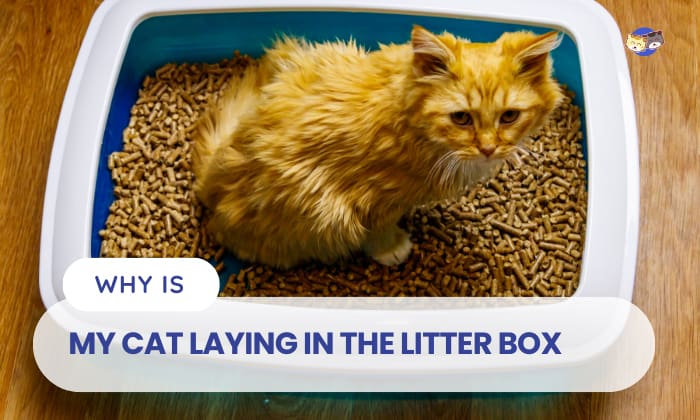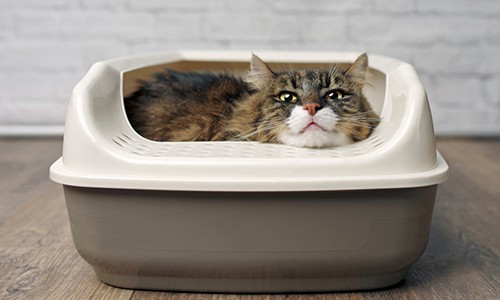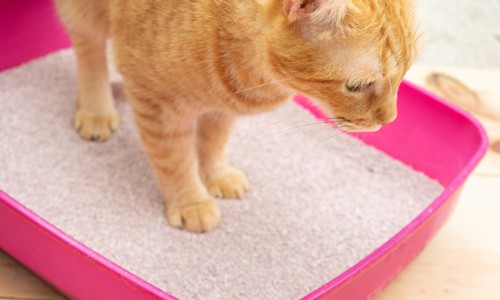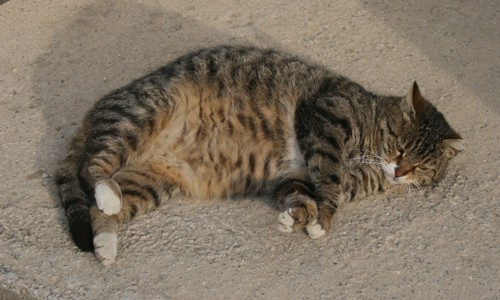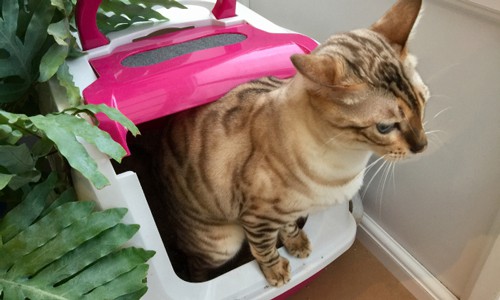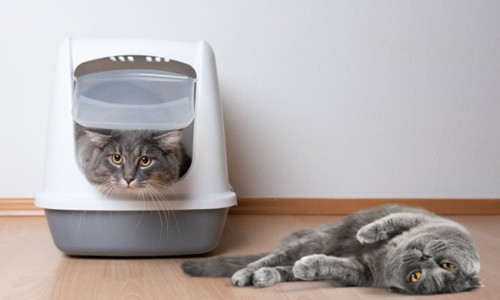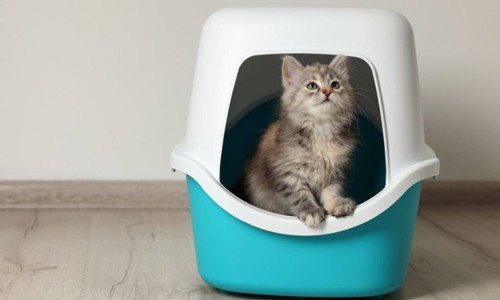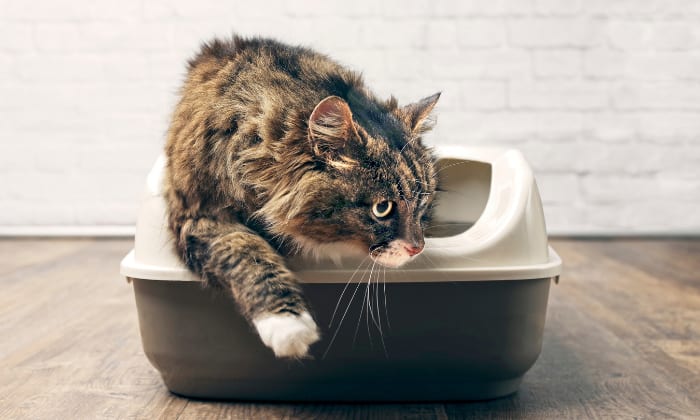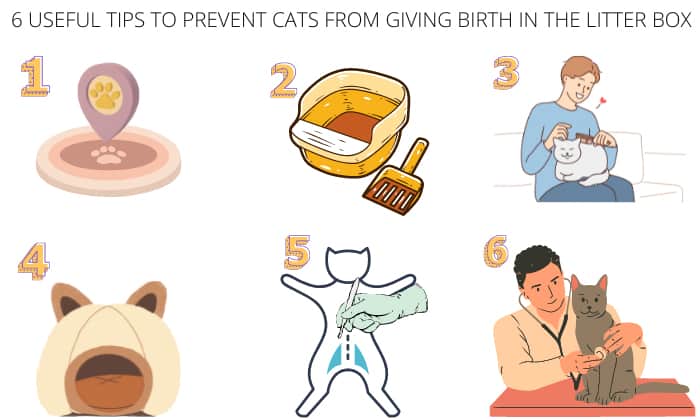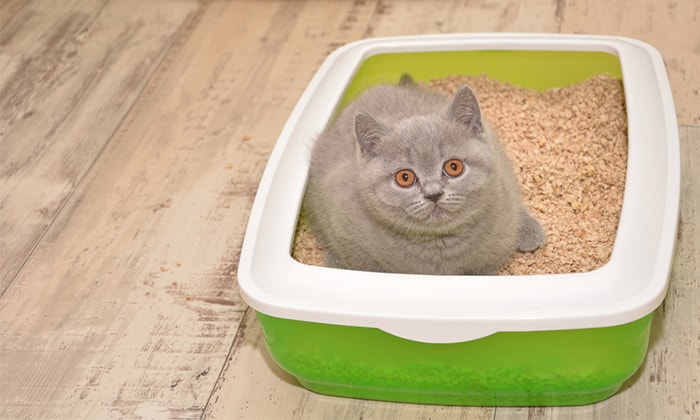You come from a long tiring day at work and head straight to your kitty’s litter box, only to find your feline friend curled up and napping inside. While this may seem odd, it’s not uncommon for cats to use their litter box as a makeshift bed.
But why would they do this? Why is my cat laying in the litter box?
Like other cat mystiques, there could be underlying reasons for this behavior. It could be a medical implication, for territorial marking, or your furry friend just wanted to feel some comfort in their litter box.
Read on to find out more and learn how you can help them avoid this behavior.
Table of Contents
The Secret Behind This Feline Behavior
As fur parents, we often get the privilege of witnessing the different wonders of our feline babies each day! One example is when your little cat just sits in litter box all of a sudden.
Buckle up as we uncover the secrets and underlying reasons behind your cat’s peculiar habits!
The Possible Reasons Why Your Cat Just Laying in Its Litter Box
Medical Causes
1. Sign of Illness
When your dear cat lies in litter box, it could be an indication of an underlying illness, such as bladder blockage, arthritis, or dementia.
Sick cats, much like humans, instinctively seek out a quiet and safe haven. In some cases, your feline buddy may lack the energy or strength to climb out of the litter box, making it a convenient spot to rest. If the issue is dementia, for example, the cat may fail to distinguish its usual sleeping spot from the toilet.
2. Bathroom Problems
When a feline is plagued by urinary difficulties, their behavior may change, leading them to spend more time in the litter box. Some common conditions that lead to this behavior are kidney problems, diabetes, and urinary tract issues.
Cats may feel the constant urge to go or experience difficulty urinating, causing them to linger in the litter box until they feel relieved. The same applies to when felines experience the symptoms of diarrhea or constipation.
So, if you see your cat prolonging its stay in the litter box but not peeing, it could be an underlying bathroom problem. In such cases, it’s always essential to seek guidance from their vets.
3. Your Feline Baby Is Going To Be A Mom Already!
During the delicate phase of pregnancy, similar to humans, a cat’s body undergoes significant transformations. These changes can impact their behavior, especially when it comes to using the litter box.
Pregnant cats often experience an increased frequency of urination, which naturally leads to spending more time in the litter box.
Furthermore, the physical toll of pregnancy places considerable stress on their bodies, potentially affecting their energy levels. As a result, pregnant cats may encounter difficulties when entering and exiting the litter box, leading them to take additional time to rest inside before emerging.
Lastly, as they approach the end of their pregnancy, maternal instincts kick in, and cats instinctively seek out quiet and secure spaces to give birth. Surprisingly, the litter box can appear as an appealing option for them.
4. A Decline In Cognitive Function
Occasionally, particularly among older cats, finding them resting or snoozing in the litter box may indicate a cognitive decline.
Alongside disturbances in their sleep patterns, heightened anxiety or irritability, confusion, alterations in social interactions, or even issues in mobility, this behavior might serve as a warning sign.
When you observe your senior cat laying in the litter box, it’s a clear signal to engage in a conversation with your veterinarian.
By addressing these concerning symptoms, you can ensure the best care and support for your beloved cat during this stage of their life.
Behavioral and Environmental Causes
1. Territorial Marking Purposes
Regarding feline behavior, territoriality can play a significant role, and some cats are more territorial than others, especially male felines. So, when your male cat is laying in litter box, it could be marking its domain! The same also goes for when you see your feline bud in front of the litter box.
If you happen to be a proud fur parent of multiple cats, it’s crucial to understand that providing an adequate number of litter boxes is essential. Likewise, the general guideline is to have one litter box per cat plus an additional one.
This approach can help minimize any potential territorial conflicts and disputes or resource guarding related to the litter boxes.
2. Might Be Feeling Stressed And Anxious
When your cat hides in litter box for a while, it can be an indication that they’re facing stress and anxiety, which prompts them to seek a small and safe place to hide. The litter box can unexpectedly provide that desired sense of security!
Changes in the environment, the presence of other animals, or separation from their owners can all contribute to a cat feeling overwhelmed. In these moments, the enclosed space of the litter box offers a familiar and predictable refuge.
While it’s important to address the underlying causes of their anxiety, understanding why they seek solace in the litter box can help create a calm and supportive environment for them.
3. Enjoying A Cozy Spot!
Cat sitting in litter box doing nothing may mean they’re simply relaxing in an unexpected place. For these tiny feline explorers, the litter box becomes more than just a spot for bathroom needs – it transforms into their cozy sanctuary.
And to ease your curiosity about why your “kitten is sleeping in litter box,” this behavior is particularly prevalent in young kittens who have recently been weaned.
These little ones, having spent their earliest days nestled with their littermates, naturally gravitate towards confined spaces that evoke a sense of security.
This is why your kitten lays in litter box or kitten thinks litter box is a bed. It gives them a reassuring embrace reminiscent of their littermate cuddles (Aww!)
Is It Normal for a Cat to Lay in Its Litter Box?
While laying in the litter box is not uncommon, it’s not necessarily normal behavior for cats. In most cases, cats prefer to use the litter box for bathroom needs only and prefer to rest in other areas.
If you notice your cat hiding in litter box with increasing frequency or for extended periods, it’s essential to address the underlying cause.
However, for old felines, it’s an entirely different story. When an old cat sleeps in litter box, death is usually near for them.
Tips to Stop Cat From Laying in the Litter Box

To help discourage your cat from laying in the litter box too much, consider implementing these essential tips:
- 1. Provide alternative resting spots
- 2. Keeping the litter box clean and the environment peaceful
- 3. Provide distractions, and you may use positive reinforcement.
- 4. Address underlying issues: Consider providing your cat with a safe and calming space for anxiety or stress-related behaviors, such as a cozy cat bed or hiding spot.
- 5. For territorial marking behaviors, spaying or neutering your cat can help to reduce the urge to mark its territory.
- 6. Consult with a veterinarian or behaviorist: If the behavior persists or is causing concern, it’s advisable to seek professional advice.
Frequently Asked Questions
What does it mean when my cat lays in a litter box?
Seeing your adorable felines lying in their litter boxes may indicate various things, such as particular medical causes, behavioral and environmental issues, and other reasons like cognitive decline.
Why does my cat lay in the litter box after I clean it?
It’s possible that your cat finds the clean litter box to be a comfortable and familiar spot, especially if they associate it with security or relaxation.
Additionally, if your cat has recently used the litter box for defecation, they may be drawn to the lingering scent, even after cleaning.
Why does my cat keep on meowing and crying in the litter box?
There could be several reasons your cat is meowing and crying in the litter box. It may indicate discomfort or pain, urinary tract issues, anxiety or stress, or a desire for attention.
Similarly, if you observe your cat sleeping in the litter box after surgery, it is often natural for them to seek this place to rest and recover. The litter box provides them with a small, enclosed space that feels secure and familiar.
Conclusion
In conclusion, the mystery of why cats sometimes choose the litter box as their personal resting spot may never be fully solved.
Still, whatever the reason, it’s important to remember that each cat is unique, and their behavior can vary. If you find your feline friend curled up in the litter box, take a moment to assess their overall well-being and consider the possible factors at play.
Who knows, maybe one day they’ll reveal the secret motive behind: “why is my cat laying in the litter box.” Until then, happy snoozing, feline friends!
Read more:

I am Amy Sawy, a Doctor of Veterinary Medicine (DVM) graduate from the University of Kansas. y husband, Dr. Plummer, and I own a veterinary clinic in Phillipsburg, Kansas. In addition to my professional background, I am a devoted pet owner myself, with a household that includes dogs, rodents, and most notably, cats – a total of five felines in my home.
In 2020, I joined an organization as a professional writer, leveraging my experience and collaborating with my team to deliver the most valuable information for your cat’s care.


